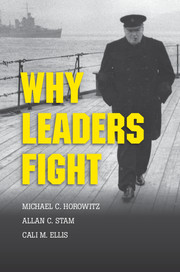Book contents
- Frontmatter
- Contents
- List of Figures
- List of Photographs
- List of Tables
- Preface
- Introduction
- 1 How Leaders Matter
- 2 Systematically Evaluating Leader Risk
- 3 Leader Risk across Geography and Time
- 4 The Experiences That Matter I: Military/Rebel Status, Age, and Education
- 5 The Experiences That Matter II: Childhood, Family, and Gender
- 6 “L’état, c'est moi” – or Is It?
- Bibliography
- Index
4 - The Experiences That Matter I: Military/Rebel Status, Age, and Education
Published online by Cambridge University Press: 05 October 2015
- Frontmatter
- Contents
- List of Figures
- List of Photographs
- List of Tables
- Preface
- Introduction
- 1 How Leaders Matter
- 2 Systematically Evaluating Leader Risk
- 3 Leader Risk across Geography and Time
- 4 The Experiences That Matter I: Military/Rebel Status, Age, and Education
- 5 The Experiences That Matter II: Childhood, Family, and Gender
- 6 “L’état, c'est moi” – or Is It?
- Bibliography
- Index
Summary
In contrast to the leader index presented and tested over the last two chapters, this chapter focuses on individual background characteristics that our theory of leader attributes suggests should make these men and women more or less prone to engage in armed conflict. Of course, in the real world, many different experiences shape leaders’ characters. That is why we start with the broader leader index. Focusing on specific background experiences can help us isolate which characteristics shape leaders’ attitudes, making them more or less inclined to use force as an active part of their states’ foreign policies.
In this chapter, we focus on four areas of experience. First, we explore the role of military service, emphasizing the way participation in combat, or the lack thereof, shapes how leaders think about the use of military force later in life. Second, focusing on rebel experience in violent movements or coups against status quo governments, we find that leaders such as Mao Zedong and Muammar Qaddafi are more disinhibited not just because of the circumstances that put them in power, but also because of their different personal beliefs about the efficacy of violence. Third, building on earlier work about leaders’ ages and their propensity to initiate military actions, this chapter explores whether younger or older leaders are more prone to conflict. Finally, while some might expect to see a significant relationship between education and conflict, as there is between education and economic policies, with more educated leaders being more likely to seek peaceful resolution to disputes, the evidence suggests there is no relationship.
Military and Rebel Experience
As discussed in Chapter 1, the single leader background experience most plausibly relevant to the initiation of military conflict is whether a leader has had prior military service. Evidence of the potential importance of military service comes from a variety of sources. In addition to the U.S. presidential examples discussed in the Introduction, our overall findings for three categories of leaders (those with national military service but no combat experience, those with national military service and combat experience, and those with prior rebel experience, e.g., military experience with a nonstate actor) show that some of the most conflict prone leaders around the world are those with military experience but no combat experience.
- Type
- Chapter
- Information
- Why Leaders Fight , pp. 129 - 147Publisher: Cambridge University PressPrint publication year: 2015

